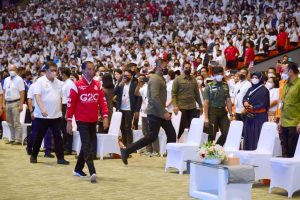Indonesian President Joko “Jokowi” Widodo will travel to Russia next week, in a bid to convince Russian President Vladimir Putin to facilitate the export of much-needed wheat from Ukraine, the Jakarta Post reported yesterday. Citing a “top government official,” the Post reported that the Indonesian president was set to announce the trip after a meeting on Monday with Foreign Minister Retno Marsudi, who has just returned from an overseas trip.
According to the report, Jokowi will attend a G7 summit in Germany next week, before traveling on to Ukraine and Russia, to mediate the ongoing conflict and attempt to “persuade Russian President Vladimir Putin to, among other things, allow Ukraine to export the globally needed wheat amid the ongoing war between the two countries.” The report added that Jokowi will also talk with Putin about the G20 Summit that Indonesia will host in Bali in November, which the Russian leader is controversially expected to attend.
Jokowi’s possible trip to Russia was first reported by the Russian state media agency TASS on June 14, which quoted Kremlin sources as saying that Jokowi would meet with Putin on June 30, earning a rebuke from Ukrainian Ambassador to Indonesia Vasyl Hamianin. While Indonesia’s decision was up to the government, “it must be understood that every dollar Russia receives, every barrel of oil sold out is used to finance this aggressive war,” he told the news magazine Tempo.
The report comes amid alarming global increases in food prices, as a result of COVID-19, supply chain issues, rising energy prices, and Russia’s invasion of Ukraine, which threatens to disrupt production and exports from one of the world’s most fertile agricultural regions. The United Nations Food and Agriculture Organization reports that the two nations together produce around 30 percent of the global wheat supply.
While Jokowi’s administration has condemned the Russian invasion, it has taken a relatively cautious line, fearing the global economic repercussions of a prolonged conflict. “The most important thing that I’m concerned with is the food price,” Jokowi said in an interview with CNBC last week. “So, we want the war in Ukraine to be stopped, resolved with negotiation so that we can concentrate [on] the economy.”
He added, “If not, it will never be over, this is dangerous for countries, particularly, developing countries.”
While Jokowi’s trip to Russia would see him step into the unfamiliar role of “peacebroker,” as the Jakarta Post styled it, it is nonetheless consistent with the overwhelming domestic focus of his presidency, and his concern about economic aftershocks from the Russia-Ukraine war.
It could also be an attempt to defuse international pressure over Putin’s possible attendance at the G20 Summit. Indonesia has already come under Western pressure to disinvite Putin from the meeting, amid broader calls for Russia to be kicked out of the group of leading economies altogether. Jakarta has also weathered criticism for its relatively cautious stance on the Russian invasion of Ukraine. While condemning Putin’s actions, it has phrased these criticisms in careful terms, and refrained from joining the international campaign of sanctions led by the advanced democracies.
While insisting that Putin is still invited to the summit, Jokowi has invited Ukrainian President Volodymyr Zelenskyy invited to attend the summit, either in person of via videolink, in a bid to mollify these criticisms. “By inviting Ukraine and Russia,” Radityo Dharmaputra of Universitas Airlangga wrote in a recent article, “Jokowi is trying to show that Indonesia can listen to Western concerns while avoiding supporting Russia outright.” Jokowi’s planned visits to Russia and Ukraine appear to reflect a similar balancing of Indonesian interests with Western opinion.
Whether either side will be ready to open the way to a negotiated settlement remains unclear, and Putin has shown that he is more than willing to leverage the specter of a global food shortages to political ends. But if Jokowi’s intervention opens the way for even a small part of Ukraine’s reduced wheat harvest to reach global markets, the Indonesian president’s detour into international peacemaking will be well worth the effort.

































